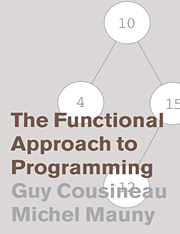III - Implementation
Published online by Cambridge University Press: 05 June 2012
Summary
This last part of the book describes techniques to implement a language like Caml. We do not pretend to give a complete description here of an implementation of Caml, but rather a demonstration that such an implementation is feasible. We treat a subset of Caml to show the major difficulties in compilation and type synthesis.
Chapter 11 defines a Caml evaluator in Caml. It highlights the main ideas that make it possible to produce a compiler: the idea of an environment is used to manage variables, and the idea of closure is used to represent functional values.
Chapter 12 tackles two topics simultaneously: compilation schema and techniques of memory management that come into play in the implementation of a functional language. With respect to memory management, only allocation is described precisely. Techniques for recovering memory (that is, garbage collection) are only briefly touched.
The set of machine instructions we use occurs at a relatively abstract level compared to all the instructions available in assembly language, but that set can nevertheless be translated into true machine instructions quite directly.
Chapter 13 describes a type synthesizer. We give you a preliminary version of it in a purely functional style; then we move on to a more efficient one, one that uses a destructive variety of the unification algorithm. This version is quite close to the actual type synthesizer in Caml.
- Type
- Chapter
- Information
- The Functional Approach to Programming , pp. 361 - 362Publisher: Cambridge University PressPrint publication year: 1998



